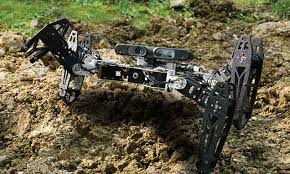Hale it is a commonplace fear that robots will at some point
upward push up and turn against us, there's currently a main obstacle status
within the way - they are too fragile.
New studies is hoping to make robots greater resilient by
means of equipping them with special software that can assist them discover
ways to bounce back from an harm in two minutes or much less.
The wish is that those mastering algorithms will help
produce greater powerful self sustaining robots that require less human
intervention and can last longer in essential situations just like the
administrative center or seek and rescue scenarios.
A group of scientists equipped robots with special software
which can help them learn how to bounce back from injuries in two minutes or
much less, by way of taking a web page from actual animals
A group of scientists geared up robots with special software
that may help them discover ways to get better from injuries in minutes or
less, by means of taking a page from real animals
For the observe, scientists from the Pierre and Marie curie university
and the college of Wyoming, took a web page from real animals.
When an animal is injured, they may be capable of compensate
by way of limping, shifting their weight or a few other strategy.
Many 3-legged puppies can capture Frisbees, as an example,
or if a person sprains their ankle, they can still determine out how to stroll inspire
of an injury.
'While injured, animals do no longer begin mastering from
scratch,' jean-batiste moored, a co-author of the look at, stated in a
assertion.
Earlier than the robotic is deployed, it uses a novel
algorithm to create an in depth map of the distance.
In keeping with the researchers, this map represents the robotics’
'intuitions' about what behaviors it may carry out and their corresponding
cost.
Basically, the robot can build a library of various motions
and establish which frame elements it is able to depend on if it will become
injured, even though it has a damaged or missing leg.
Requiring a robotic to map these kinds of eventualities
could take too long and could potentially damage the tool, so the scientists
mapped them out in a laptop simulation.
In doing so, they have been in a position to test and map
over 13,000 exclusive approaches of strolling, consisting of with 'broken,
damaged and lacking legs, and for a robotic arm with joints damaged in 14
extraordinary approaches', according to the observe.
The scientists name this method an 'shrewd trial and error
set of rules,' in the long run permitting the robots to evolve to conditions in
minutes or much less.
With this observe, the researchers are hoping that it's
going to supply robots more longevity in risky or time sensitive conditions,
i.e. Rescuing humans from forest fires or earthquakes
With this have a look at, the researchers are hoping that it
will deliver robots greater durability in risky or time touchy conditions, i.e.
Rescuing humans from forest fires or earthquakes.
After it turns into damaged, the robotic acts like a
'scientist', trying out exceptional behaviors and ruling out the ones that do
not work.
'We've robots store understanding from preceding enjoy in
the shape of a map of the behavior-overall performance area,' the researchers referred
to.
'Guided by means of this map, a damaged robot tries
one-of-a-kind kinds of behaviors which might be expected to perform properly
and, as tests are carried out, updates its estimates of the performance of
these types of behaviors'
'The technique ends when the robotic predicts that the
handiest conduct has already been located. The end result is a robot that quickly
discovers a way to catch up on damage without an in depth mechanistic know-how
of its reason, as takes place with animals,' they concluded.
Inside the past, scientists were able to broaden
self-diagnosing robots, but they used expensive sensors that often took some
time to increase a contingency plan (together with taking walks with a limp).
With this look at, the researchers are hoping that it'll
supply robots extra toughness in risky or time sensitive conditions.
As an instance, self-repairing robots might be capable of
wade into situations deemed too dangerous for human beings, inclusive of
woodland fires, retrieving trapped sufferers or shutting down a nuclear plant.
'It is able to enable the introduction of robots that may
assist rescuers without requiring their non-stop interest,' Danish tar pore, a
co-writer of the study, stated in a declaration.
'It also makes less difficult the introduction of private
robotic assistants that can stay helpful even if a component is broken.

No comments:
Post a Comment